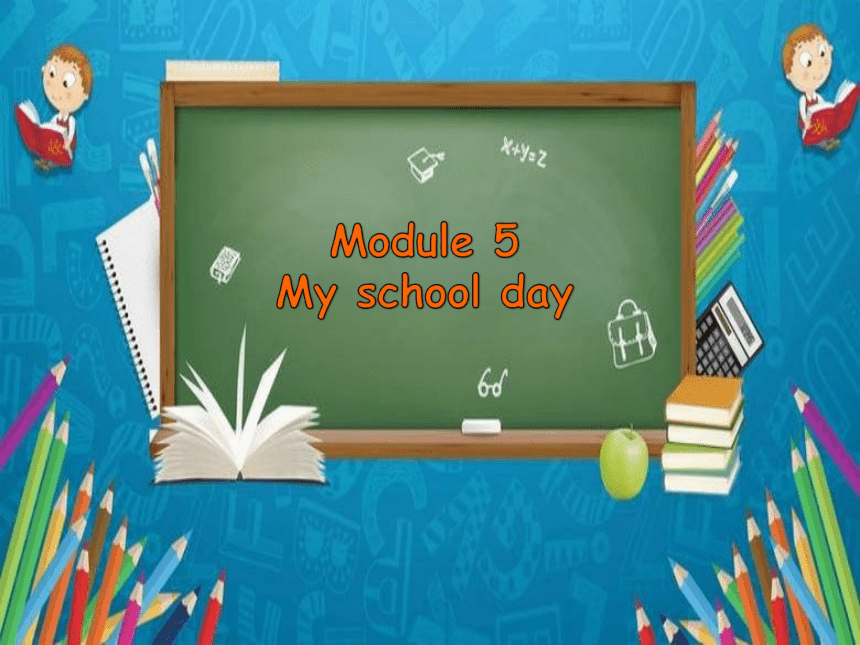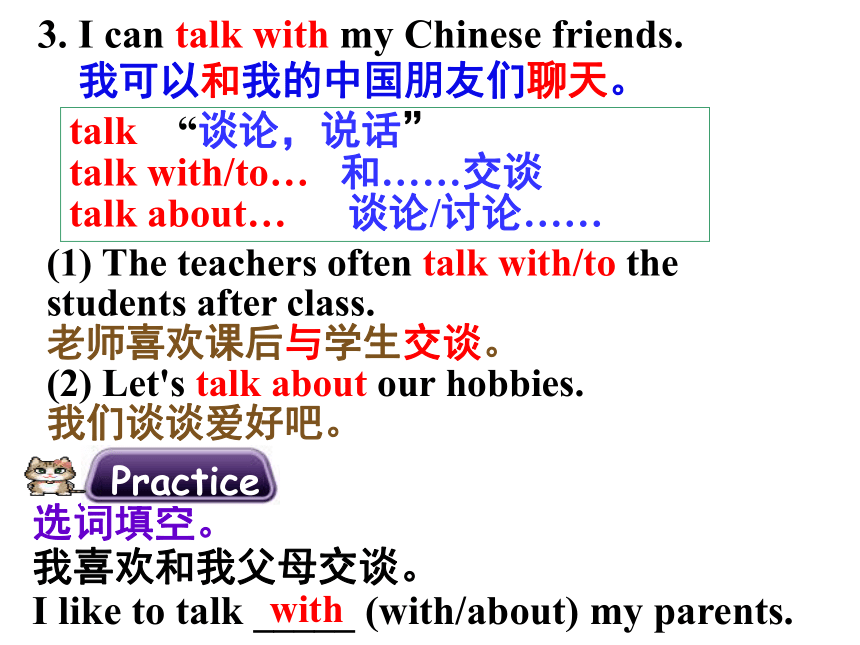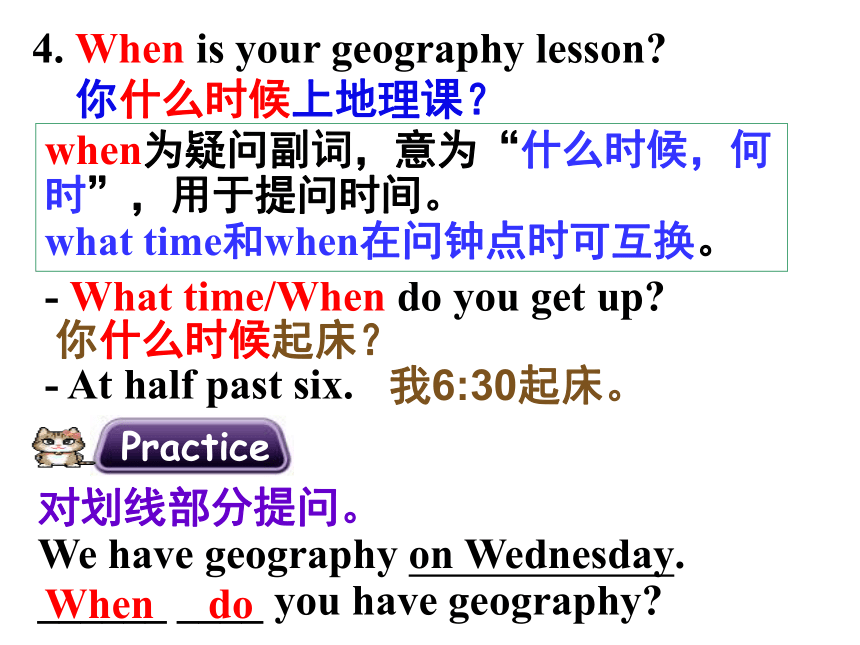外研版七年级上册Module 5 My school day Language points课件(共13张PPT)
文档属性
| 名称 | 外研版七年级上册Module 5 My school day Language points课件(共13张PPT) |  | |
| 格式 | pptx | ||
| 文件大小 | 362.8KB | ||
| 资源类型 | 教案 | ||
| 版本资源 | 外研版 | ||
| 科目 | 英语 | ||
| 更新时间 | 2022-10-01 23:28:10 | ||
图片预览






文档简介
(共13张PPT)
Module 5
My school day
Language points
1. I love history and I'm good at it.
我喜欢历史课而且学得不错。
(1) My friend is good at language and she can speak five foreign languages.
我的朋友在语言方面很擅长,她能讲五种外语。
(2) Ms Du's son is good at making things.
杜老师的儿子擅长做东西。
be good at… “擅长……”
Unit 1
2. It's my favourite subject because it's very interesting.
历史是我最喜欢的科目,因为它生动有趣。
because: 连词, 意为 “因为”,引导原因状语从句, 对原因提问用why;
★注意:英语中because和so不能同时出现在一个句子中。
(1) I don't like maths because it's very
difficult.
(2) I love many vegetables because they are good for my health.
我不喜欢数学,因为数学太难了。
我很喜欢蔬菜,因为它们有益于健康。
3. I can talk with my Chinese friends.
我可以和我的中国朋友们聊天。
talk “谈论,说话”
talk with/to… 和……交谈
talk about… 谈论/讨论……
(1) The teachers often talk with/to the students after class.
老师喜欢课后与学生交谈。
(2) Let's talk about our hobbies.
我们谈谈爱好吧。
选词填空。
我喜欢和我父母交谈。
I like to talk _____ (with/about) my parents.
Practice
with
4. When is your geography lesson
你什么时候上地理课?
when为疑问副词,意为“什么时候,何时”,用于提问时间。
what time和when在问钟点时可互换。
- What time/When do you get up
你什么时候起床?
- At half past six.
对划线部分提问。
We have geography on Wednesday.
______ ____ you have geography
Practice
When do
我6:30起床。
Language points
1. I go to school on weekdays.
周一至周五我要上学。
go to+地点名词 “去…… ”
The little boy wants to go to school now.
这个小男孩现在想要去学校。
go home意为“回家”, home在此是副
词,前面不能加to。
Let's go home after school.
我们放学后一起回家吧。
Unit 2
完成句子。
(1) 我们早上11点钟去操场踢足球,下午五点钟回家。
I __________________ and play football at 11:00 am, and I _________ at 5:00 pm.
(2)大明每天7:30去学校,晚上10:00睡觉。
Daming ___________ at 7:30am, and __________ 10:00pm.
Practice
go to the playground
go home
go to school
go to bed
2. I get up at half past seven in the morning, and then have breakfast.
我早晨7点半起床,然后吃早餐。
have是英语中常见的一个动词,和不同
的词搭配有不同的意思:
1) My father has (got) a computer.
2) I have lunch at 12:00.
3) Have some coffee, please.
4) We don't have any lessons on Sunday.
5) On Saturday, I have a busy day.
→表示“喝”
→表示“吃”
→表示“有”
→表示“上课”
→表示“度过”
完成句子。
1. 我有一本新词典。
I _____ ____ a new dictionary.
2. 我们上午上四节课。
We ____ ____ _______ in the morning.
3. 他早上七点吃早餐。
He ___ ________ at seven in the morning.
Practice
have got
have four lessons
has breakfast
3. We start work at nine o'clock.
我们九点开始上课。
I have a lot of work to do.
我有很多工作要做。
* work 用作不可数名词,其前不能直接用不定冠词 a 修饰,其后也不能加 s。
* work 还可作动词,意为“工作,学习”
He works at the hospital.
他在当地的医院工作。
开始学习,工作
4. At eleven o'clock, we have a break in
the playground.
11点钟的时候,我们在操场上休息。
I'm tired now. Let's have a break and drink some water.
我现在累了,咱们休息一会儿,喝点水吧。
break作名词,意为“(课间) 休息”
☆ have a break与take a break同义,意为“休息”
5. In the evening, I watch TV and have dinner with my family.
晚上我看电视,和家人共进晚餐。
*watch作动词,意为“看,观看”
*“看电视、 看比赛以及各种表演等”要用watch
My parents watch TV on Saturday evening.
我父母周六晚上看电视。
watch作名词时,意为“手表”,其复数形式是watches。
I bought two watches yesterday.
我昨天买了两支手表。
6. I do my homework and go to bed at
ten o'clock.
我做完作业,10点上床睡觉。
do one's homework “做作业”
注意:其中one's意为“某人的”,使用时要改成与主语一致的形容词性物主代词形式。
选择填空。
We do _____ homework at seven o'clock.
Practice
our
Module 5
My school day
Language points
1. I love history and I'm good at it.
我喜欢历史课而且学得不错。
(1) My friend is good at language and she can speak five foreign languages.
我的朋友在语言方面很擅长,她能讲五种外语。
(2) Ms Du's son is good at making things.
杜老师的儿子擅长做东西。
be good at… “擅长……”
Unit 1
2. It's my favourite subject because it's very interesting.
历史是我最喜欢的科目,因为它生动有趣。
because: 连词, 意为 “因为”,引导原因状语从句, 对原因提问用why;
★注意:英语中because和so不能同时出现在一个句子中。
(1) I don't like maths because it's very
difficult.
(2) I love many vegetables because they are good for my health.
我不喜欢数学,因为数学太难了。
我很喜欢蔬菜,因为它们有益于健康。
3. I can talk with my Chinese friends.
我可以和我的中国朋友们聊天。
talk “谈论,说话”
talk with/to… 和……交谈
talk about… 谈论/讨论……
(1) The teachers often talk with/to the students after class.
老师喜欢课后与学生交谈。
(2) Let's talk about our hobbies.
我们谈谈爱好吧。
选词填空。
我喜欢和我父母交谈。
I like to talk _____ (with/about) my parents.
Practice
with
4. When is your geography lesson
你什么时候上地理课?
when为疑问副词,意为“什么时候,何时”,用于提问时间。
what time和when在问钟点时可互换。
- What time/When do you get up
你什么时候起床?
- At half past six.
对划线部分提问。
We have geography on Wednesday.
______ ____ you have geography
Practice
When do
我6:30起床。
Language points
1. I go to school on weekdays.
周一至周五我要上学。
go to+地点名词 “去…… ”
The little boy wants to go to school now.
这个小男孩现在想要去学校。
go home意为“回家”, home在此是副
词,前面不能加to。
Let's go home after school.
我们放学后一起回家吧。
Unit 2
完成句子。
(1) 我们早上11点钟去操场踢足球,下午五点钟回家。
I __________________ and play football at 11:00 am, and I _________ at 5:00 pm.
(2)大明每天7:30去学校,晚上10:00睡觉。
Daming ___________ at 7:30am, and __________ 10:00pm.
Practice
go to the playground
go home
go to school
go to bed
2. I get up at half past seven in the morning, and then have breakfast.
我早晨7点半起床,然后吃早餐。
have是英语中常见的一个动词,和不同
的词搭配有不同的意思:
1) My father has (got) a computer.
2) I have lunch at 12:00.
3) Have some coffee, please.
4) We don't have any lessons on Sunday.
5) On Saturday, I have a busy day.
→表示“喝”
→表示“吃”
→表示“有”
→表示“上课”
→表示“度过”
完成句子。
1. 我有一本新词典。
I _____ ____ a new dictionary.
2. 我们上午上四节课。
We ____ ____ _______ in the morning.
3. 他早上七点吃早餐。
He ___ ________ at seven in the morning.
Practice
have got
have four lessons
has breakfast
3. We start work at nine o'clock.
我们九点开始上课。
I have a lot of work to do.
我有很多工作要做。
* work 用作不可数名词,其前不能直接用不定冠词 a 修饰,其后也不能加 s。
* work 还可作动词,意为“工作,学习”
He works at the hospital.
他在当地的医院工作。
开始学习,工作
4. At eleven o'clock, we have a break in
the playground.
11点钟的时候,我们在操场上休息。
I'm tired now. Let's have a break and drink some water.
我现在累了,咱们休息一会儿,喝点水吧。
break作名词,意为“(课间) 休息”
☆ have a break与take a break同义,意为“休息”
5. In the evening, I watch TV and have dinner with my family.
晚上我看电视,和家人共进晚餐。
*watch作动词,意为“看,观看”
*“看电视、 看比赛以及各种表演等”要用watch
My parents watch TV on Saturday evening.
我父母周六晚上看电视。
watch作名词时,意为“手表”,其复数形式是watches。
I bought two watches yesterday.
我昨天买了两支手表。
6. I do my homework and go to bed at
ten o'clock.
我做完作业,10点上床睡觉。
do one's homework “做作业”
注意:其中one's意为“某人的”,使用时要改成与主语一致的形容词性物主代词形式。
选择填空。
We do _____ homework at seven o'clock.
Practice
our
同课章节目录
- Starte
- Module 1 My teacher and my friends
- Module 2 My English lesson
- Module 3 My English book
- Module 4 My everyday life
- Module 1 My classmates
- Unit 1 Nice to meet you.
- Unit 2 I'm Wang Lingling and I'm thirteen years ol
- Unit 3 Language in use.
- Module 2 My family
- Unit 1 Is this your mum?
- Unit 2 These are my parents.
- Unit 3 Language in use.
- Module 3 My school
- Unit 1 There are thirty students in my class.
- Unit 2 The library is on the left of the playgroun
- Unit 3 Language in use.
- Module 4 Healthy food
- Unit 1 We've got lots of apples.
- Unit 2 Is your food and drink healthy?
- Unit 3 Language in use.
- Module 5 My school day
- Unit 1 I love history.
- Unit 2 We start work at nine o'clock.
- Unit 3 Language in use.
- Revision module A
- Module 6 A trip to the zoo
- Unit 1 Does it eat meat?
- Unit 2 The tiger lives in Asia.
- Unit 3 Language in use.
- Module 7 Computers
- Unit 1 How do I write my homework on the computer?
- Unit 2 When do you use a computer?
- Unit 3 Language in use.
- Module 8 Choosing presents
- Unit 1 I always like birthday parties.
- Unit 2 She often goes to concerts.
- Unit 3 Language in use.
- Module 9 People and places
- Unit 1 We're enjoying the school trip a lot.
- Unit 2 They're waiting for buses or trains.
- Unit 3 Language in use.
- Module 10 Spring Festival
- Unit 1 Are you getting ready for Spring Festival?
- Unit 2 My mother's cleaning our houses and sweepin
- Unit 3 Language in use.
- Revision module B
